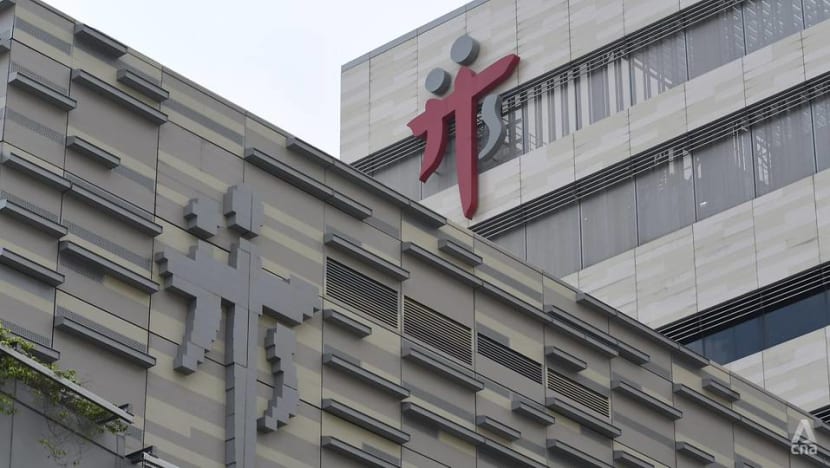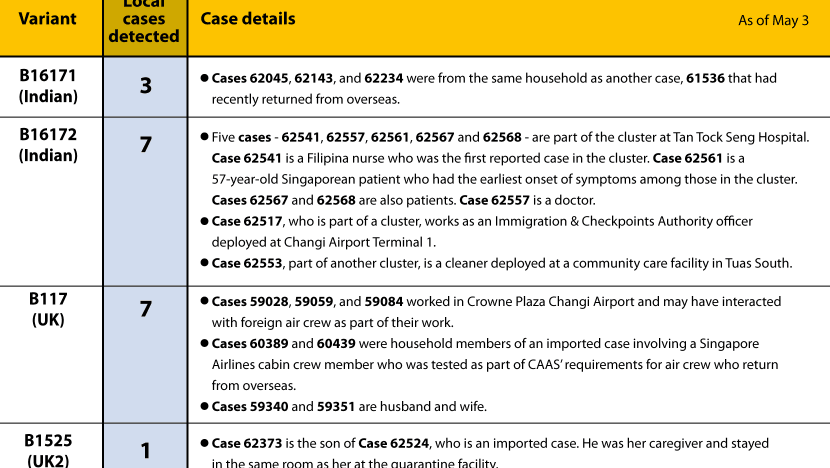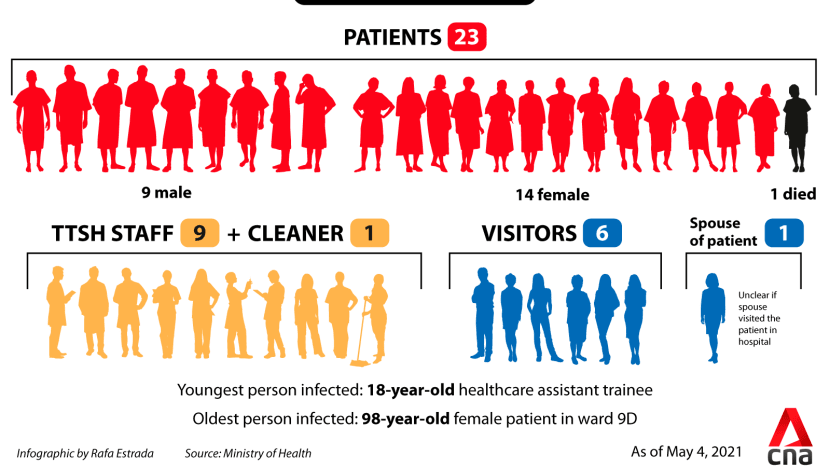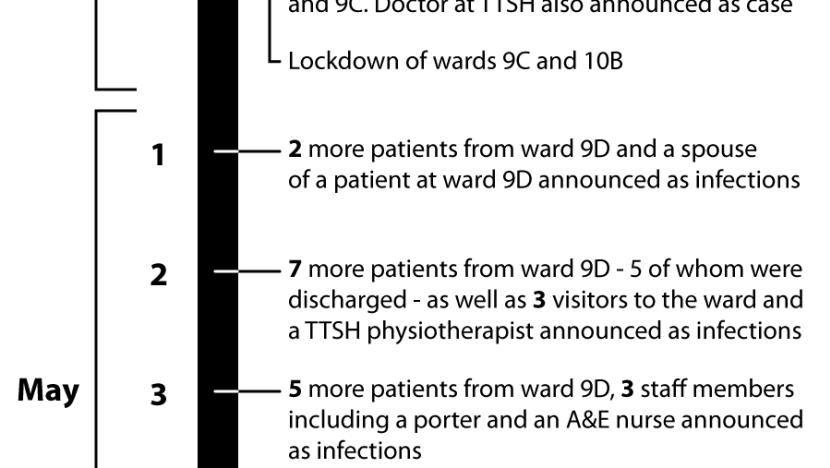5 COVID-19 cases in Tan Tock Seng Hospital cluster have Indian variant of coronavirus
Singapore has discovered 29 local COVID-19 cases and 475 imported cases with overseas variants of the virus.

View of Tan Tock Seng Hospital in Singapore on Apr 30, 2021. (Photo: Calvin Oh)
SINGAPORE: Five COVID-19 cases in the Tan Tock Seng Hospital (TTSH) cluster have been found to have an Indian variant of the virus, said the Ministry of Health's (MOH) director of medical services Kenneth Mak on Tuesday (May 4).
Speaking at a press conference by the COVID-19 multi-ministry task force, Associate Professor Mak said a total of seven cases in three local clusters have the B16172 (Indian) variant of the virus.
For the TTSH cluster, the cases with the B16172 variant include a 57-year-old man who had onset of symptoms on Apr 16 but did not seek treatment. He was warded at TTSH Ward 7D on Apr 18 and tested negative for COVID-19. Two days later, he transferred to Ward 9D. He was reported as a confirmed case on Apr 28.
The other cases at TTSH with the B16172 variant of the virus are a 46-year-old nurse who was the cluster's first detected case on Apr 27, as well as a doctor and two other patients.
READ: A timeline of the Tan Tock Seng Hospital COVID-19 cluster
READ: Cap of 5 people for social gatherings, household visits to return as Singapore tightens COVID-19 measures
Besides the five cases at TTSH, one case with the B16172 variant is the Immigration and Checkpoints Authority (ICA) officer deployed at Changi Airport Terminal 1. The other case is the cleaner deployed at a community care facility at Tuas South.
The viruses in each cluster are “phylogenetically distinct”, which suggests that the clusters are not linked to one another, said MOH.
“Based on the early phylogenetic information available to us, the (TTSH) cluster is due to a viral variant, but the vaccine appears to have done relatively well against it,” said Assoc Prof Mak.
READ: 5 more COVID-19 cases linked to TTSH cluster, 12 new imported infections
REPORTS OF VIRUS VARIANTS IN SINGAPORE
As of Monday, 29 local cases were identified to be infected with “variants of interest, or variants of concern", said Assoc Prof Mak. A total of 475 imported cases are detected with such variants.

Assoc Prof Mak said Singapore can also expect to see "more viral variants" identified over time, and that all necessary public health action has been taken to isolate and ring fence the cases.
Education Minister Lawrence Wong, co-chair of the task force, said: "The new variant strains have higher attack rates, they are more infectious, they are causing larger clusters than before.”
"Due to the new variants, (the cases) are more infectious and larger clusters are forming," he added.
"As compared to say, months ago when we did have unlinked cases – but then you have one or two, and they would stop there, you wouldn't have such big clusters – this doesn't seem to be the case more recently with the ICA cluster, and the TTSH cluster," he said.
This is why tighter public health measures are required, he added.
READ: Travellers with recent travel history to higher risk places will serve 21-day stay-home notice from May 8
Assoc Prof Mak said that the “presence of viral variants of concern among our local cases affirms” Singapore’s vaccination strategy that prioritised healthcare workers and older Singaporeans.
Had Singapore not done so, the TTSH cluster would have been “significantly larger”, Assoc Prof Mak said.
He added that out of the 40 reported cases in the TTSH cluster, eight cases who had been vaccinated were either asymptomatic or exhibited very mild symptoms, and none required oxygen therapy.
Of those who were not protected by vaccinations, seven of the 20 needed oxygen therapy.
UPDATE ON TAN TOCK SENG HOSPITAL CLUSTER
The cluster linked to TTSH has continued to grow, with a total of 40 cases linked to it as of Tuesday, making it the largest active COVID-19 cluster currently.

Providing an update on the hospital cluster, Health Minister Gan Kim Yong said testing of all inpatients at the hospital has been completed.
“The results have all been negative, other than those whom we have already announced. Yesterday, we completed a second round of testing of these inpatients, and the results are pending," he added.
“Some of them may be incubating, and may become positive in the days ahead, and we will continue to monitor them."
Testing of all 12,000 staff members on campus is also in progress. So far, about 10,000 employees have completed testing.
"We will give an update, as and when the results are out. Our aim is to leave no stone unturned and try our best to find infected cases as early as possible," Mr Gan said.
"We are carrying out surveillance testing for individuals who have been to public places that the cases have visited during the infectious period. This can help us detect cases quickly so that we can ring fence them and prevent further transmission in the community."
READ: What we know so far about the 8 active COVID-19 clusters other than the TTSH cluster
When asked if some patients and visitors were reportedly not wearing masks in TTSH wards, Assoc Prof Mak said investigations are still ongoing.
"Is it because of not wearing masks or a lack of discipline in maintaining discipline in infection control? Well, that is one possibility that we always look at, but we did note that there was a clustering of cases really around one single ward - Ward 9D," he added.
"And we are exploring the possibility that there are other local influences, particularly related to the ward that may have also influenced a super-spreading event occurring, leading to these cases."
For instance, authorities are studying the possibility of issues with airflow and ventilation in the ward, among other hypotheses, he said.
Mr Gan noted that other institutions in the healthcare system are stepping up to ensure continuity of care for TTSH patients.
“We are also preparing the healthcare system for any potential rise in community causes, and the emergence of new clusters. We hope it will not happen, but we must be prepared for it," the Health Minister added.

BOOKMARK THIS: Our comprehensive coverage of the coronavirus outbreak and its developments
Download our app or subscribe to our Telegram channel for the latest updates on the coronavirus outbreak: https://cna.asia/telegram












